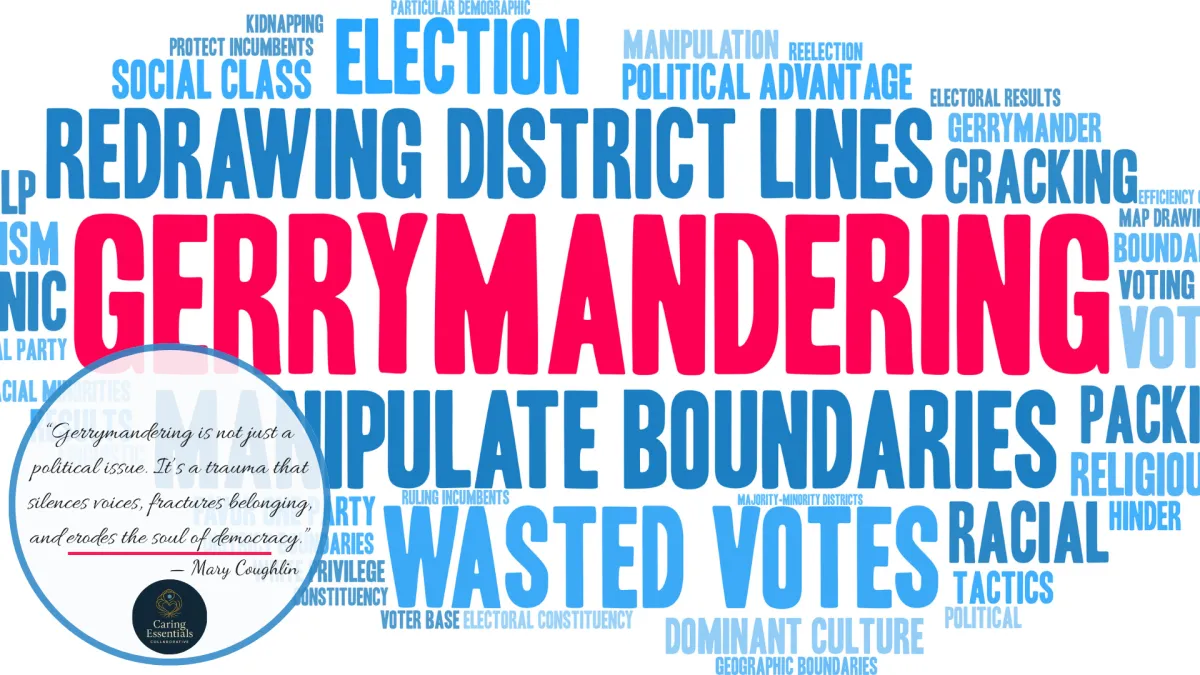
This Is What Gerrymandering Does to Us - And Why a Trauma-Informed Response Is Essential
“Gerrymandering is not just a political issue. It’s a trauma that silences voices, fractures belonging, and erodes the soul of democracy.” - Mary Coughlin
This Is What Gerrymandering Does to Us - And Why a Trauma-Informed Response Is Essential
What the Human Cost Looks Like
We often think of gerrymandering as a wonky political issue—something for legal scholars or Supreme Court justices to debate. But let’s tell the truth:
Gerrymandering is a trauma.
It’s a systematic distortion of voice, power, and representation.
And it hurts—not just politically, but psychologically, developmentally, and communally.
It tells communities:
You don’t belong.
You won’t be understood.
You don’t get a say in your own future.
Sound familiar?
For those of us who work in trauma-informed developmental care (TIDC), this hits close to home. We know what happens when power is imbalanced, when trust is broken, when people—especially those already marginalized—are ignored or manipulated. We see the long-term consequences of what happens when systems prioritize control over connection.
Gerrymandering is a civic parallel to what happens in fragmented healthcare systems. It strips people of agency. It ruptures relationship. It instills a sense of futility. And worst of all, it does this most aggressively to those who are already most vulnerable.
What the Science Tells Us
Psychological safety—whether in an ICU or a democracy—requires predictability, transparency, and fairness. Gerrymandering undermines all three. It inflames collective stress, fuels disconnection, and cultivates helplessness. It’s no wonder civic participation is declining.
When people sense the game is rigged, they stop playing.
But democracy isn’t a game—it’s a shared, living ecosystem. And when we disengage, that ecosystem withers.
What the Human Cost Looks Like
Parents whose districts are cut in half, their voices diluted.
Communities of color packed or cracked to weaken their political influence.
Young voters told, explicitly or implicitly, that their future doesn’t count.
This is not democracy.
It’s domination disguised as due process.
How the B.U.F.F.E.R. Framework Responds
This is where trauma-informed professionals have something powerful to offer—not just in clinical settings, but in our public discourse and civic imagination.
Let’s reframe what’s possible through the B.U.F.F.E.R. lens:
B = Belonging
Gerrymandering isolates. We respond by reweaving community, affirming each person’s rightful place in the civic fabric.U = Understood
Gerrymandering obscures truth. We advocate for visibility, for stories to be heard and reflected in policy.F = Forgiveness
Not as erasure, but as a willingness to re-enter relationship—to repair what’s been broken, with accountability at the center.F = Frameworks
We counter manipulative maps with frameworks of integrity, care, and shared power.E = Equanimity
While gerrymandering thrives on chaos, we respond with steadiness rooted in justice and compassion.R = Respect
Representation is respect. Period. We demand systems that recognize every voice as worthy and every life as sacred.
A Call to Remember
If you’ve ever been told your voice doesn’t matter,
If you’ve ever felt like a number in someone else’s strategy,
If you’ve ever watched a system pretend to serve you while actually silencing you—
Then you already understand the trauma of gerrymandering.
But here’s the radical hope:
We can respond differently.
Just as we’ve transformed care at the bedside through trauma-informed principles, we can transform democracy. Not through rage alone—but through relational repair, shared frameworks, and trauma-informed resistance.
This is not about left or right.
It’s about right and wrong.
It’s about who we are.
And who we choose to be—together.
What You Can Do
Learn how gerrymandering works in your state
Support independent redistricting commissions
Amplify voices in communities being silenced
Educate others on the trauma-informed lens
Vote in every election—especially the local ones that shape redistricting
I’ll leave you with this:
“Democracy is not a spectator sport. It’s a daily practice of belonging.”
Let’s make sure every voice counts—and every life matters.
Because caring is essential.
In the NICU.
In the voting booth.
And in the story we’re still writing—together.
Take care and care well,
Mary
